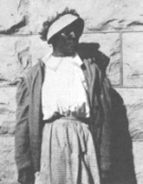Celebrating the Life of Cathay Williams, the First Female Buffalo Soldier
Born in September of 1842, Cathay Williams was a slave who would later come to pose as a man under the pseudonym Williams Cathay in order to join the army, becoming the first African-American female to enlist. Although her father was free, her mother was a slave which made her a slave. She worked on a plantation in Jefferson City, Missouri until 1861 when the area fell under Union control during the Civil War. As such, she was freed from her plantation work, however, early on in the Civil War slaves were pressed to join the Union army as support staff, such as cooks, laundresses or nurses. For the duration of the war, she continued to accompany different regiments across locations including Arkansas, Georgia, Louisiana and Washington D.C.
At that time, women were not allowed to serve in the military, however on November 15, 1866 Cathay Williams enlisted under the pseudonym William Cathay with the 38th U.S. infantry posing as a man. During her military career, only her cousin and one friend knew her secret and both of them served in her regiment.
Williams contracted smallpox, after which ‘he’ was hospitalized regularly. Eventually, this led to her sex being discovered by the surgeon two years into her service. He informed her commanding officer who discharged her in 1868. After she was discovered, she worked as a cook and later a seamstress. She was married for a short while to a man who stole her savings, whom she later had arrested.
Williams’ story eventually came to light in 1876 when she was living in Trinidad, Colorado. A reporter from the St. Louis Daily Times heard rumor of an African-American woman who had served in the military and investigated it, interviewing her and publishing a story.
Williams’ later applied for a military pension, following the precedent of women who had been awarded pensions after disguising themselves as men during the Revolutionary War. Suffering from diabetes, most of her toes had been amputated and she had to walk with crutches. Despite the media attention she had received from the article, in 1891 after an examination by a doctor she was denied a pension. She is assumed to have died soon thereafter.
Although Cathay Williams made her mark in history for becoming the first African American woman to enlist in the Army, it is disheartening to consider how difficult and challenging her later life was despite this accomplishment. Williams’ initial reason for joining was to become financially stable, however she died impoverished, denied the pension she had earned through her service.
At that time, women were not allowed to serve in the military, however on November 15, 1866 Cathay Williams enlisted under the pseudonym William Cathay with the 38th U.S. infantry posing as a man. During her military career, only her cousin and one friend knew her secret and both of them served in her regiment.
Williams contracted smallpox, after which ‘he’ was hospitalized regularly. Eventually, this led to her sex being discovered by the surgeon two years into her service. He informed her commanding officer who discharged her in 1868. After she was discovered, she worked as a cook and later a seamstress. She was married for a short while to a man who stole her savings, whom she later had arrested.
Williams’ story eventually came to light in 1876 when she was living in Trinidad, Colorado. A reporter from the St. Louis Daily Times heard rumor of an African-American woman who had served in the military and investigated it, interviewing her and publishing a story.
Williams’ later applied for a military pension, following the precedent of women who had been awarded pensions after disguising themselves as men during the Revolutionary War. Suffering from diabetes, most of her toes had been amputated and she had to walk with crutches. Despite the media attention she had received from the article, in 1891 after an examination by a doctor she was denied a pension. She is assumed to have died soon thereafter.
Although Cathay Williams made her mark in history for becoming the first African American woman to enlist in the Army, it is disheartening to consider how difficult and challenging her later life was despite this accomplishment. Williams’ initial reason for joining was to become financially stable, however she died impoverished, denied the pension she had earned through her service.

